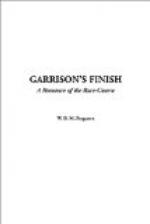And then, womanlike, Sue fainted, and Garrison was just in time to ease her through his arms to the ground. The two horses, thoroughly blown, placidly settled down to nibble the grass by the wayside.
Sue lay there, her wealth of hair clouding Garrison’s shoulder. He watched consciousness return, the flutter of her breath. The perfume of her skin was in his nostrils, his mouth; stealing away his honor. He held her close. She shivered.
He fought to keep from kissing her as she lay there unarmed. Then her throat pulsed; her eyes opened. Garrison kissed her again and again; gripping her as a drowning man grips at a passing straw.
With a great heave and a passionate cry she flung him from her. She rose unsteadily to her feet. He stood, shame engulfing him. Then she caught her breath hard.
“Oh!” she said softly, “it’s—it’s you!” She laughed tremulously. “I—I thought it was Mr. Waterbury.”
Relief, longing was in the voice. She made a pleading motion with her arms—a child longing for its mother’s neck. He did not see, heed. He was nervously running his hand through his hair, face flaming. Silence.
“Mr. Waterbury was thrown. I took his mount,” he blurted out, at length. “Are you hurt?”
She shook her head without replying; biting her lips. She was devouring him with her eyes; eyes dark with passion. The memory of that moment in his arms was seething within her. Why—why had she not known! They looked at each other; eye to eye; soul to soul. Neither spoke.
She shivered, though the night was warm.
“Why did you call me Miss Desha?” she asked, at length.
“Because,” he said feebly—his nature was true to his Southern name. He was fighting self like the girl—“I’m going away,” he added. It had to come with a rush or not at all. And it must come. He heaved his chest as a swimmer seeks to breast the waves. “I’m not worthy of you. I’m a—a beast,” he said. “I lied to you; lied when I said I was not Garrison. I am Billy Garrison. I did not know that I was. I know now. Know——”
“I knew you were,” said the girl simply. “Why did you try to hide it? Shame?”
“No.” In sharp staccato sentences he told her of his lapse of memory. “It was not because I was a thief; because I was kicked from the turf; because I was a horse-poisoner—”
“Then—it’s true?” she asked.
“That I’m a—beast?” he asked grimly. “Yes, it’s true. You doubt me, don’t you? You think I knew my identity, my crimes all along, and that I was afraid. Say you doubt me.”
“I believe you,” she said quietly.
“Thank you,” he replied as quietly.
“And—you think it necessary, imperative that you go away?” There was an unuttered sob in her voice, though she sought to choke it back.
“I do.” He laughed a little—the laugh that had caused the righteous Dan Crimmins to wince.




